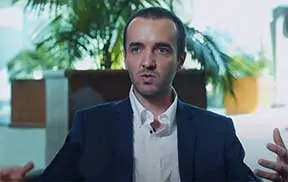

Our industry is in a period of a rapid transition to digital data management, but particularly on landfills. Often you read that the latest technology, whether by a brilliant programmer or rolling out as part of a takeover, is innovative. Linking technology and innovation is becoming commonplace, but they are not the same. Innovation is a human process requiring experimentation and iteration to solve landfill issues that often have nothing to do with computers or mobile phones. Landfill technology or apps are tools.
Innovation takes a team of diverse expertise, different perspectives with a constant desire to learn, and most importantly, the primary desire to make landfill operations more efficient and safe. Innovators use technology when and how it makes sense to improve environmental management, profitability, and care for employees and the local community. Lower cost solutions for the vast amount of data collection completed faster and without human error come from people with hands-on in-the-field experience. When it comes to landfill technology, its value is clear when a landfill practitioner demonstrates how the particular technology fits into a solution. The nice part is they also get to the point and skip the tech-speak and jargon.
The Landfill Technology Evolution Started Here in 2003
Back in 2003, SCS couldn’t find technology that would enable our engineers and technicians to support landfill operations as we desired. Proving the proverb “necessity is the mother of invention,” we developed a database for our use. Its value in the field was immediate, and SCS continued to adapt and develop SCS DataServices® and SCS MobileTools®, basing refinements on each landfill and client need. It took people in the waste industry to make the right technology tools for the industry.

Meet Oliver Early, SCS’s DataServices and MobileTools Product Manager. Oliver started his career managing landfill operations. He became interested in technology because it got results for him as a landfill manager of 15 facilities. By combining a comprehensive investigation of physical landfill systems, such as landfill gas collection and control and other environmental monitoring and control systems with evaluations of compliance areas, he improved his landfill system performance and substantially increased power plant production. He used multivariate data techniques, including time series and network analysis, to scrutinize and refine results. Merging DataServices capabilities under Oliver’s guidance took SCS’s original internal database to a timesaving product for all landfills, not just the landfills SCS operates.
The platform, called SCS eTools®, includes modules for leachate, groundwater, DataServices, and the newest application SCS MobileTools, free for those using DataServices. The technology is currently in use on over 630 landfills nationwide and benefits all of SCS’s design, build, and operations work.
For example, if methane readings at a gas probe are elevated, that’s an indication of a potential LFG migration issue. While expertise is great – it could take hours to diagnose and mitigate. With DataServices, you could run an evaluation of the existing well field in a few minutes, ruling out issues with current wells. With the touch of a button, you can share the information with your team and focus on potential mitigation recommendations.
Remote Monitoring and Control Technology Didn’t Happen Overnight Either
The best and most innovative solutions come from combining the stakeholders’ experiences and thoughts. Let’s meet a few of the people who lead other landfill innovations.

In addition to being a licensed drone pilot herself, flying over 100 landfills, Business Manager Melissa Russo uses SCS Remote Monitoring and Control (RMC) technology to support her landfill clients. Her contributions increase safety and lower environmental risk using unmanned aerial vehicles to gather field data at a lower cost. Melissa developed SCS’s national drone and geographic information systems (GIS) programs to respond to her clients’ needs for expensive regulatory and operating challenges. As a result, capturing more (methane) greenhouse gas instead of releasing it into the atmosphere provides the obvious environmental benefits, and landfill personnel have better and safer working conditions.
Depending on the sensor or camera attached, her pilots can monitor methane concentrations using a tunable diode laser, measure and map surface temperatures to mitigate elevated temperature conditions, or create topography, aerial imagery, and estimate filling volumes. Operators can view, detect and measure changes over time, gaining insight into critical infrastructures such as water infiltration, liquid flow, and vegetation distributions. Melissa’s use of GIS provides a low-cost solution to data management and sharing between field and office.
Melissa is an innovator who genuinely cares about our industry, taking the time to listen and truly understand her clients’ challenges and long-term goals. Only then does she devise customized solutions, regardless of whether it uses technology or not. See Melissa at work.
The Internet of Things (IoT) is Bang for Your Buck

SCS RMC’s Business Manager is David Hostetter. His experience includes remote monitoring and controls systems engineering, construction, and operation; landfill gas and leachate engineering; and mechanical engineering. Dave’s focus is on automating remote process control of landfill systems, landfill gas blower/flare stations, wellfield vacuum and flow, along with leachate and groundwater pumping systems, weather equipment, and air monitors.
As a landfill gas engineer, his impetus was to avoid production downtime and keep operations within regulatory mandates. He wanted his clients to see what was happening at any given time and be alerted to atypical conditions. As a landfill engineer, he knows that “prevention is better than cure,” as long as it’s cost-effective. Dave’s solution is to leverage the Internet of Things through SCS RMC systems. Each piece of equipment you want to monitor gets a sensor. His team configures each sensor or group of sensors to parameters based on his operator’s business needs and environmental reporting responsibilities. A local wireless network communicates with a base station providing continuous readings from each sensor.
RMC sends alerts if readings are outside an acceptable range or if an environmental threshold is nearing exceedance. Alerts go to the landfill’s designated staff or technicians via smartphones, computers, or tablets. From these devices, users access their interface to control, start, stop, and reset field systems and analyze system operation. They can also view data, graphs, tables, alarms, and reports.
That’s more than convenience; it saves labor dollars spent to diagnose and reset these systems and is especially valuable for remote landfills. By design, clients can enable custom authorization levels for their systems. Naturally, the analytical tools are easy to use, understand, and report, as he explains in his video.
Albert Einstein Said…
“You can’t solve a problem on the same level that it was created. You have to rise above it to the next level.” We’re not comparing ourselves to Einstein, but all three SCSers leading their teams know that compliance policy never stops changing, and landfills are unique beasts made up of complex systems that need balance to perform. Performance is based on daily decisions and landfill readings generating enormous amounts of data. SCS’s job is to make your job better by collecting those millions of data bits for analysis faster, helping landfill operators use the intelligence to identify the cause and appropriate response to hundreds of issues that are part of landfill or facility management.
The backbone of every service at SCS Engineers is to design and develop based on our clients’ specific needs. As innovators, our mission is to leverage proven technology to meet those needs. As our founders did, we strive to understand our clients’ current and future needs, then develop or integrate the appropriate technology to meet those needs.
SCS is one of the most experienced and successful environmental compliance, design-build, operations, and maintenance firms in the United States. No stand-alone technology company can substitute for our knowledge and hands-on experience with innovative landfill design, build, and operations.
Visit SCS Engineers to discover SCS eTools and SCS RMC capabilities. You’ll find case studies, technology awards, and more resources for using technology to manage labor, liquids, air monitoring, groundwater, volume, GHGs, and more